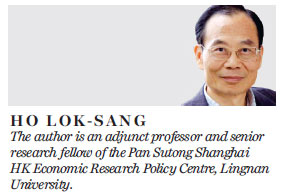We should not rush to judgment
Updated: 2015-10-22 07:28
By Ho Lok-Sang(HK Edition)
|
|||||||
Ho Lok-sang says it is time some people in Hong Kong showed more respect to those with views different from their own and also upheld the city's core values
Recently, I have grown increasingly worried about Hong Kong. I see more people including professionals make unfair judgments about other people's motivations. Just because a member of the University of Hong Kong (HKU) Council votes against the appointment of Johannes Chan Man-mun to the pro-vice chancellorship, then he or she is considered to have betrayed his or her soul. He or she must have succumbed to political pressure from the Chief Executive or from Beijing. If someone makes a judgment different from theirs, this person must be morally inferior. Just because T.M. Lee, a well known philosopher and popular author, criticized Billy Fung Jing-en, the HKU student union president and an elected member to the university council, for leaking the contents of the discussions at the council meeting on the Johannes Chan affair, an article criticizes him for having failed his teacher Mou Zongsan, yielding to authoritarianism, and "calling a deer a horse".
I wonder how those who disagree with the decision of the university council came to the conclusion that council members who voted "no" to Chan's appointment did not exercise their best judgment with the long-term interests of the university in mind. Many of those critical of the university council decision cited as evidence strong objections to Chan's proposed appointment voiced in pro-establishment newspapers. But Hong Kong is supposed to uphold freedom of speech. Such opinions published in pro-establishment newspapers do not in themselves constitute pressuring council members into setting aside their best judgment.

Professor Lo Chung-mau's recent Letter to Hong Kong, a radio program of RTHK, was addressed to Billy Fung. He said, "I see being elected to the university council as part of my duty to the university. I was overwhelmed with only a sense of responsibility, but not of power." Lo also added that he was going to receive a surgical operation on his knee shortly, dispelling any suspicion that he was faking an injury on the day students stormed into the meeting room, as was alleged. That accusation is unfair, as is the claim that he voted against Johannes Chan's appointment because Chan did not console him when he was in pain. Many netizens and pundits used this made-up story to mock him.
One of Hong Kong's core values is that we accept the outcome of a process which has been agreed upon, whether or not the outcome is in our favor. We must honor what we have solemnly pledged. Members of the council are aware of the need to abide by its rules before they accept the appointment as a member of the council. One of these rules is confidentiality. The rule of confidentiality as well as the anonymous vote is there to protect members from outside pressures, i.e., to preserve the autonomy of the university. Only under the protection of confidentiality and anonymity of the vote can each member speak his or her own mind, and cast his or her vote according to conscience. Yet Fung, the union president, who is so vocal against outside pressures that might undermine the autonomy of the university, broke the rule that is there to protect the university against outside, particularly political, pressures. The irony is that the unruly act gained applause from many who are supposed to know better.
Fung justified his action by referring to the public interest. But why breaking a rule that preserves the university's autonomy would further the public interest is completely beyond me.
Critics of the university council's decision say disapproving a recommendation made by the search committee is unprecedented. It is therefore a deviation from procedural justice. But the "umbrella movement" was unprecedented in Hong Kong's history. University professors launching an "Occupy Central" movement was also unprecedented. It is entirely possible some members of the university council disapprove of "Occupy" and of senior university staff supporting the illegal activity. Why can't the critics accept that these are legitimate concerns and those who voted down Chan's appointment had the interests of HKU and Hong Kong at heart? Criticizing the council or its members simply because the one does not like the council's decision is nothing but trying to impose one's will on the university. Organizing protests will not disguise the fact that this behavior is blatantly exerting political pressure to undermine the autonomy of the university. Concluding that someone is not suitable to serve as a member of the university council based on your views undermines freedom of speech. Instead of preserving the core values of Hong Kong, these critics (and people like Fung) are undermining these core values.
I have no personal objections to Johannes Chan at all. But I respect the mechanism of the university council as the final gatekeeper. That the council has the final say is nothing new. It is part of established practice. I have no reason to doubt the integrity of the members of the council, who have nothing to gain personally from the decision one way or the other. Some members, like Wong Kai-man, are already retired. Can we not respect people who have different views from us?
(HK Edition 10/22/2015 page8)